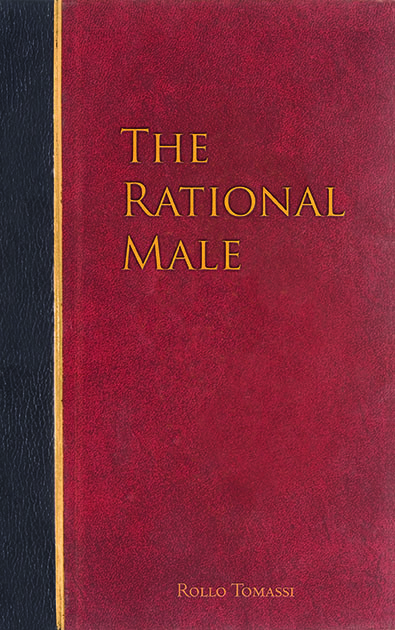Over three years ago I was introduced to the manosphere through Roosh. Shortly thereafter I became familiar with a number of writers who covered a broad range of topics important to men, including game, style, weight lifting, nutrition with the overarching theme of taking the “Red Pill”, an analogy from The Matrix movies referring to “unplugging” from socially enforced conventions about men and women.
The most influential for me of all of these writers was Rollo Tomassi and his Rational Male blog. After reading the first post by him, I spent several hours reading every other post he wrote since the beginning of his blog in 2011. His insights didn’t start then though, as he’d been very active on the So-Suave Forum for a decade hence.
The Rational Male book is the culmination of a dozen years of dissecting and reflecting on male and female behavior and how the genders relate. The books scope is very wide and covers a range of subjects broken down into the following sections: The Basics, Plate Theory, Plugged In, Unplugging, Game, Communication, Social Conventions, Hypergamy, The Iron Rules of Tomassi, Mythology, and The Feminine Imperative.
There is far too much material in this book to cover in a review, as just the sections I highlighted run into the dozens of pages, so for brevity’s sake I will focus on two complementary elements that have been critical to my personal development over the past several years, namely: ONEitis (a subsection of The Basics) and Plate Theory.
Tomassi defines ONEitis as: An unhealthy romantic obsession with a single person. Usually accompanied by unreciprocated affection and completely unrealistic idealization of the said person.
The two major instances of ONEitis in my life was my first LTR and a Lithuanian girl I met over 5 years ago.
ONEitis
My first long-term girlfriend broke up with me in my second week of college, distance wasn’t an issue since I was still living at home and commuting, but other factors including her drug use, depression about being adopted and my neediness (I had tearfully convinced her not to break up with me several months prior) all came to a head. My reaction was to double down on the neediness and try to convince her why we should be back together, this turned her off completely and I was left in the dust. The funny part is that I was thinking about breaking up with her before this because I couldn’t imagine a future together, but since she made the ultimate decision on her terms, I grappled to rebuild whatever bond I thought we had.
Suffice to say that we didn’t get back together, but the extreme sense of confusion and her seemingly 180-degree flip to stone-cold indifference towards me, along with my inability to meet new women, led me into a deep depression. After many visits to psychiatrists, numerous anti-depressant medications and the passage of time (I stopped taking the meds after a few years), I came to some sense of normalcy. I still couldn’t quite shake the question of why she had broken up with me, and the idea that if only we had stayed together, everything would have been fine.
A decade after the breakup I found my answers in Rollo’s writings. I had become obsessed with my first real girlfriend and also the first girl I had sex with and had let the bad experience shape most of my 20s, precisely the time when I should have been meeting and dating many women.
I met the Lithuanian girl through work and ended up spending most of a week with her while she was visiting California. Despite the strong chemistry we had, I never even went for a kiss, thinking that this girl was so feminine, intelligent and perfect in every way, that I’d be a fool to jeopardize it by rushing things to quickly. To be honest I didn’t have a clue about “escalation” of any sort, I thought things between and a woman just developed naturally through forces we didn’t control. I stayed in contact with her for two years, exchanging emails, text messages and even letters on occassion. There were periods of coolness where she wouldn’t reply for weeks at a time, but I always fell back into the fold when she did. I was even projecting into the future about how to move to Europe to be with her.
She finally made a return visit two years later (she ignored my messages about visiting her while I was on a trip to Warsaw, an hour’s flight from Vilnius where she lived). During her visit I made every attempt to impress her and even at one point professed my desire to spend my life with her (mind you I had never even kissed her), but she diplomatically deflected my pronouncements, telling me I was “very brave” for telling her that. By the time she left I had ended up finding out that she was engaged and soon to marry a Lithuanian guy.
My disillusionment was severe, but within a year or two I had learned that I had been used as an “emotional tampon” and while she may have had genuine feelings for me, I wasn’t a realistic option for a relationship, not the least problem of which was that we lived on separate continents. Though the emotional toll of this episode was less severe than with my ex-girlfriend, I had idealized this girl to a far greater extreme, telling myself that I needed to be a far better man to be worthy of her.
Spinning Plates
As Rollo writes: …the essence of plate theory is that a man is as confident and valuable as his options. This is the essence of the abundance mindset – confidence is derived from options.
Rollo’s Plate Theory uses the analogy of the circus trick of keeping plates spinning on a pole to describe the situation when a man keeps his options open by dating multiple women. Unlike in the circus act, it’s ok for some women to “fall off” as long as a man is maintaining at least several plates.
I’ve been practicing this method for several years and it has undeniably improved my confidence and given me a breadth of experience with women that I was sorely lacking.
A vital component of plate spinning is “brutal honesty and a commitment to truthful, non-exclusivity with the plates you’re spinning.” I think this is critically important to not leading girls on in believing an exclusive relationship is in the cards or in play. A point that I disagree with Rollo on though is that you can let a woman know or “…covertly perceive, that you wont be exclusive…” I think that you have to verbally communicate this to a woman at some point early on in the relationship, since creating a covert perception isn’t a foolproof, nor sincere way of communication and women will often rationalize things in a way that’s contrary to your intentions. This can leave the door open for strife and pain for the both of you when things come to a head with overt communication.
I learned this the hard way with a girl I was seeing for nearly six months last year. She was a sexually inexperienced virgin, so we didn’t go all the way, but we were intimate in other ways over time. My failing was in not talking to her about our mutual expectations in the first few months and instead let the situation progress to where things boiled over when she questioned what I saw her as and whether I was seeing other women. In retrospect I should have cooled things off or ended them once I saw that progress wasn’t happening as I wanted it to, instead of keeping her on the backburner while seeing other women.
I really never want to make this mistake again and will strive to keep my intentions front and center in the early stages of any relationship. It will certainly lead to at least some women not agreeing to it, but its not worth the pain it’ll cause once months of investment are made.
An illustration of this concept is the emotional pain that the Facebook post announcing the new relationship of the girl mentioned above caused in me. It revived the pain and emotional turmoil that I thought had passed. I realized that I hadn’t processed the lessons of this experience and was falling back into ONEitis thinking, contemplating all the ways I could have started an exclusive relationship with her and avoided all this pain. While dating her would probably have been fine (she was one of the better girls that I have met in recent years), I think my despair was based on a temporary lack of options.
Its amazing how quickly you can revert to your previous frame of reference, just to find a buffer to avoid pain, in this case a relationship that would have limited all my other options for intimacy and probably have made me unhappier in the long run. Within a few days I had met a number of women through daygame, and planned a number of dates. Simply having the options reassured me that not only are there “plenty of fish in the sea”, but I attracted them on the initial approach, had their numbers and dates were lined up.
Saving Lives
The most valuable part of The Rational Male is that it can be a life-saving tool for men. Mental anguish over failed relationships has probably motivated millions of suicides over the course of history and in this book, men finally have reasoned answers to the most pressing questions of “why she did X, Y or Z”. Rollo himself has written about men who’ve contacted him, grateful for his writings and how they helped to save or revive a relationship or simply to prevent a man from succumbing to the mental anguish that has led others to “swallow a bullet” in Rollo’s words.
My depression was pretty severe in my late teens and early twenties so I can relate to having thoughts of suicide, though luckily they never became more than a thought. Rollo’s writing though, moreso than anyone else I’ve encountered, gave me the answers, however difficult, to process over a decade of emotions and experiences that were unexplainable to me before and no specialist, friend or family member ever came close to providing the insights to that Rollo did.
The Rational Male is a book that should be read by all men. A man’s romantic life is arguably the most important part of his existence, it dictates how or if his DNA will be passed on, whether or not he will have a successful relationship(s) or bad experiences, painful breakups, involuntary celibacy or divorce.
The Rational Male is the guidebook for the overarching principles directing the sexual market that both men and women are a part of. Assuming I have sons and grandsons one day, they’ll be getting this book. These are universal observations that will stand the test of time.





